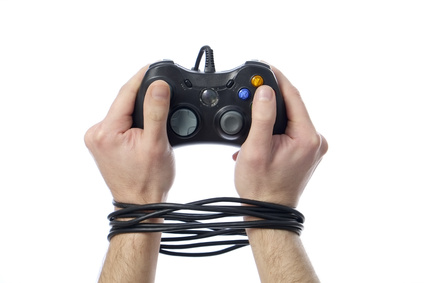There’s a New Teacher in Town…Get to Know Him
I have observed a new teacher in town interacting with our children. This teacher is a pro…incredible, amazingly effective. He actively engages our children to get them involved in the learning process. Children learn under his tutelage without even knowing it; and, even more amazing, they have fun doing it! This teacher gets children to practice skills and thinking patterns over and over again without getting bored. In fact, after practicing skills and thinking patterns all afternoon, the children under his tutelage are still eager and excited to practice some more. They even beg to continue. When the children make a mistake, he dishes out a quick and simple punishment and then offers them another chance before they forget the  lesson of the mistake. This teacher also follows each success, each accomplishment, with a swift reward. He really is an amazing teacher…one of the best. His name is Mr. Video Game. That’s right. Video games, whether X-Box, Play Station, I-Phones, I-Pads, or home computers are the new teachers in town. They are teaching our children lessons every step of the way, changing their brains and impacting their thinking in amazing ways…some good and some not so good.
lesson of the mistake. This teacher also follows each success, each accomplishment, with a swift reward. He really is an amazing teacher…one of the best. His name is Mr. Video Game. That’s right. Video games, whether X-Box, Play Station, I-Phones, I-Pads, or home computers are the new teachers in town. They are teaching our children lessons every step of the way, changing their brains and impacting their thinking in amazing ways…some good and some not so good.
First, here are some good lessons learned and mental skills enhanced by playing video games:
- Following instructions is a must for playing video games. Break the rules of the game and your game ends quickly.
- Problem solving. Many video games encourage the player to devise creative ways to solve puzzles and problems or to get around various obstacles.
- Dexterity. Video games require the player to use fine motor skills and hand-eye coordination to manage their character and manipulate virtual objects.
- Attention to detail and spatial relations. Video game players must keep track of their characters position, movement in space, speed, and aim as well as the details of the objects, friends, and enemies in their environment. Interestingly, at least one study suggests that video game experience is related to better surgical skills for adults (read it here).
- Planning and use of resources. Successful players learn to plan ahead in order to make the most efficient use of limited resources in games like Minecraft.
- Quick thinking and decision making. Many video games demand that a player quickly analyze a situation and decide on a plan of action. The more accurate their decision, the more successful the game. This is a useful skill in today’s fast-paced world (read about it here).
- Studies have also shown that video games can be used to successfully reduce anxiety (read a study here) and reduce cravings (read abstract here).
- Video games can also result in increased gray matter in parts of the brain associated with memory, strategic planning, and working memory. This increase may help reduce the risk of dementia (read about it here).
- We could list other benefits like providing the opportunity for parent and child to play together, perseverance, memory, teamwork, fun, etc. Many of these benefits can be had outside of video games as well.
On the other hand, video games can teach negative lessons as well. For instance…
- Social isolation can result from spending too much time playing video games and not becoming involved in other face-to-face activities.
- Video games can become addictive (read more here). Kids who appear addicted to video games often exhibit more anxiety and depression. They fight more often with peers and argue more with teachers.
- Video games can contribute to obesity and muscular issues when played too often.
- Academic achievement decreases as video game playing increases. Children will skip homework to play and play instead of reading or engaging in an educational activity (read study here).
- Video games can teach negative values. Some video games include violent behaviors, sexually provocative characters, and inappropriate language. Many video games also reward vengeance, aggression, and violent solutions.
- Research also suggests that children who play more violent video games are more likely to engage in aggressive thoughts, feelings, and behaviors. The video game allows the player to repeatedly view violence from the perspective of a perpetrator and then experience a reward.
As you can see, video games teach our children a lot…some good lessons and some dangerous lessons. Ultimately, parents are responsible for their children’s education. We need to monitor this new teacher in town, make some hard decisions and establish some firm boundaries. Here are some suggestions to help monitor the impact of video games in your child’s life.
- Keep the video game console in a common area of the home. This way you will know when your children play, what game they play, and the content of that game.
 Play the video game with your children. You do not have to play every time they play. However, playing sometimes when they play will establish your “presence” as part of the game just as going to visit their school helps to establish your presence in the school.
Play the video game with your children. You do not have to play every time they play. However, playing sometimes when they play will establish your “presence” as part of the game just as going to visit their school helps to establish your presence in the school.- Check the game ratings. The Entertainment Software Rating Board (ESRB) has established ratings to help parents know the age appropriateness of game content. For instance, a “M-Mature” game is rated by the ESRB as a game for 17-years-old and up.
- Set limits around video game playing. Limits can include: the amount of time your children play video games, what games they play, when they play, expected behaviors during and after game playing, and other tasks that take priority over game playing.
- Educate your children about internet safety and protocol. Teach them to not share personal information with other players. Watch for “cyberbullies” or other inappropriate materials that your children might encounter. Monitor your children to assure they do not engage in cyberbullying or the sending of inappropriate materials. Children often do things without thinking through the consequences. So, even if you have generally well-behaved children, monitor their activity to prevent immature, but dangerous, mistakes.
- Learn how to use the parental controls on your video game system to monitor activity, block players if necessary, limit inappropriate material, etc. ESRB and the PTA offer an excellent brochure that can help in each of these areas (download it here).